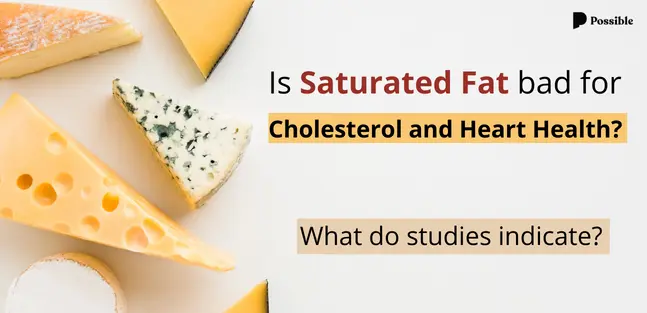food, Food & Nutrition, Health
Is Saturated Fat Bad for Cholesterol and Heart Health? What Do Studies Indicate?
For decades, we have been fed the idea that saturated fat is bad for your heart. The idea became popular in the 1970s and since then consumption of saturated fat has gone down significantly. But the incidence of heart disease has also gone up significantly. So the advice of reducing saturated fat does not seem to be working.
In this article, we will review the notion of whether you should consume saturated fats or not.
If you want to know more about different kinds of fat and why they are needed by the body, read this article – ‘All About Fat’, Does fats make you fat?
What Do Studies (especially meta-studies) Say About Saturated Fats?
Meta studies are a compilation of multiple studies and it includes only “best of the best” studies. Hence, meta-studies are a more credible source for any research.
In this article, we will review multiple meta-studies to answer this complex question. Because such an important question should not be based on opinion but on facts.
Study 1: Patty Siri-Tarino, Ph.D., and Ronald Krauss, M.D., of the Children’s Hospital Oakland Research Institute; Frank B. Hu, M.D., of Harvard (2012, 21 studies were studied; 347,747 subjects)
Findings: “Intake of saturated fat was not associated with an increased risk of coronary heart disease or stroke, nor was it associated with an increased risk of cardiovascular disease (CVD)”.
Study 2: ”Saturated Fat, Carbohydrates and Cardiovascular Disease”, Netherlands Journal of Medicine (2011)
Findings: “The dietary intake of saturated fatty acids is associated with a modest increase in serum total cholesterol, but not associated with cardiovascular disease.”
Study 3: R. Chowdhury et. al., “Association of Dietary, Circulating and Supplement Fatty Acids with Coronary Risk: A Systematic Review and Meta-Analysis,” Annals of Internal Medicine (2014; over 30 studies)
Findings: No increased risk of heart disease from eating saturated fat – as well as no association with saturated fat biomarkers.
Study 4: F. de Meester and A.P. Simopoulos, eds. “A Balanced Omega 6/Omega3 Fatt Acid Ratio, Cholesterol and Coronary Heart Disease,” World Review of Nutrition and Dietetics (2009); T. Hamazaki, Y. Kirihara, and Y. Ogushi, “Blood Cholesterol as a Good Marker of Health in Japan,” World Review of Nutrition and Dietetics (Sample size of over 150,000)
Findings: People were placed into 4 groups depending on their cholesterol levels: <160 mg/dl, 160-199 mg/dl, 200-239 mg/dl and >240 mg/dl. You would expect people with higher cholesterol levels (>200) should have a shorter lifespan, right? But the findings were the opposite. The group with the lowest cholesterol levels died at the highest rate.
There are multiple other studies that indicate the same thing. Saturated fat is not the villain it’s made out to be.
Sally Fallon says in her book Skinny on Fat (2001), ‘consumption of saturated fats has gone down considerably. What has increased: consumption of dietary vegetable oils, contained in shortening, margarine, and refined oils. This grew by a staggering 400%, while sugar and processed food consumption rose by about 60%.’
The above data clearly states that there is more to heart disease than saturated fats.
All Saturated Fats are Not Equal
Saturated fats found in dairy products (ghee, butter) has short-chain fatty acids and are easier to digest. Whereas saturated fat found in animal fats are long-chain fatty acids that are hard to digest and can damage cardiovascular health. So, it is best to restrict the consumption of fat from animal sources.
Ghee Can Help Burn Stubborn Fat
Ghee is thought to be a bad type of fat because of its high saturated fat content, but ghee has stable saturated bonds so it does not form any dangerous free radicals while cooking and is also metabolized very readily by the body. Studies have shown that ghee reduces cholesterol in the serum and intestine. Ghee is good for the brain and nerves and unlike butter and other oils, ghee stimulates the secretion of stomach acids which helps in digestion. Rich in antioxidants, it helps in strengthening the immune system.
Ghee also helps in getting rid of stubborn fat. Yes, it’s true! But with the advent of refined oils, the gateway to a spectrum of diseases opened up. So, it actually helps to eat the shudh desi ghee. However, moderation is the key, and in the case of ghee, only a teaspoon a day is recommended.
Conclusion
The debate on whether saturated fat is good or bad will go on for some time. More and more research is pointing out that saturated fat is not the villain it’s made it out to be. In fact, many saturated fats like ghee and coconut oil are good for your health. But don’t go overboard and start splurging on it. It is best to eat anything in moderation. Even too many apples can be a problem. Having 2-3 teaspoons of ghee/coconut oil daily is good for your health. But not 10 teaspoons. But not taking fats or saturated fats is even more harmful. So, maintain balance and have a varied source of fats in your diet including saturated fats.
